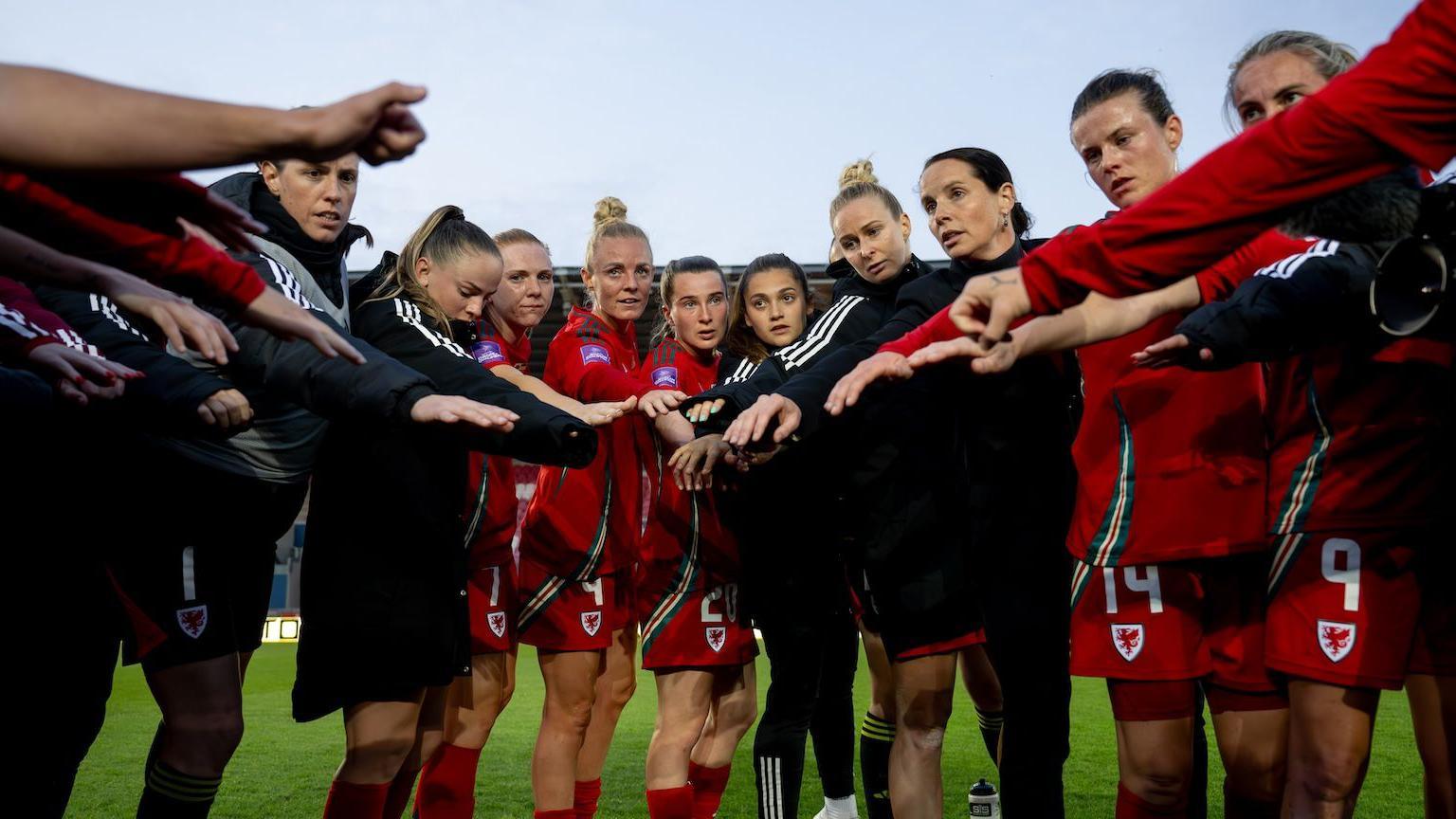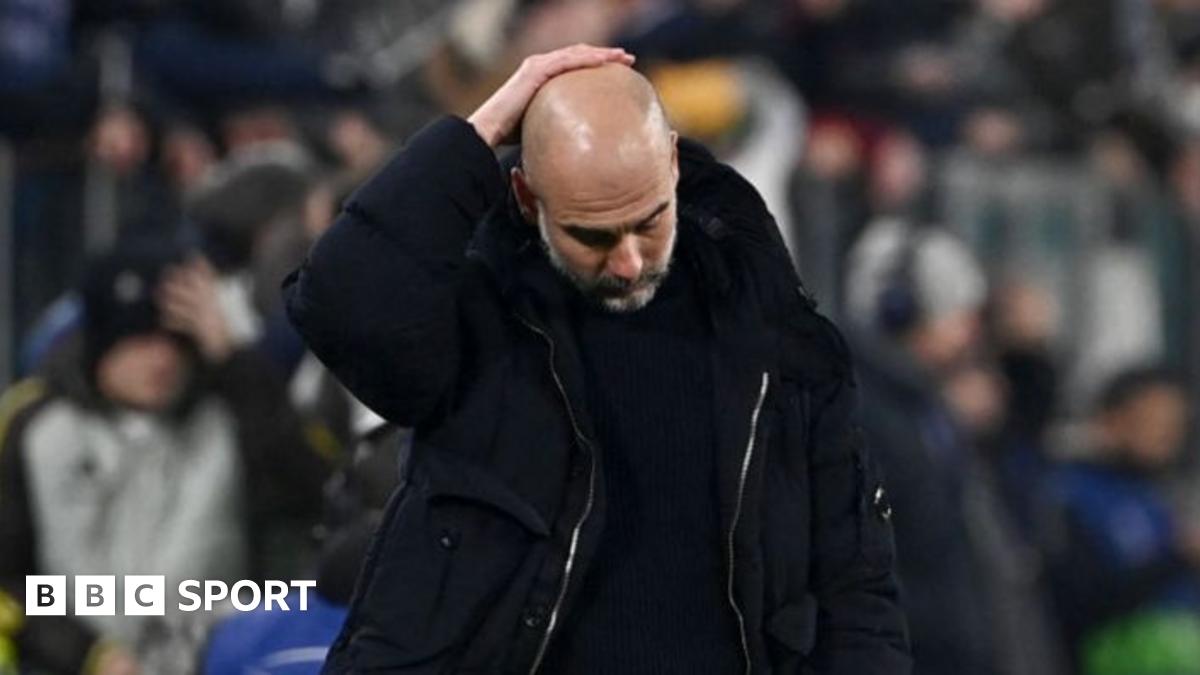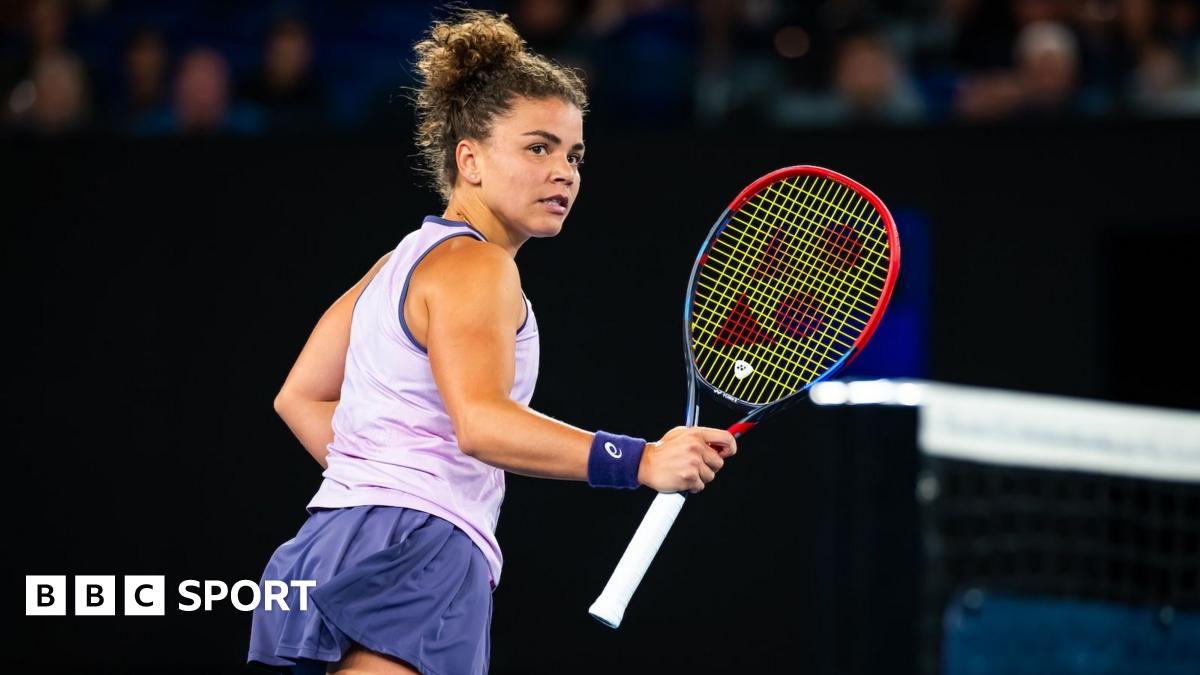ARTICLE AD BOX
 Image source, FAW
Image source, FAW
Manager Rhian Wilkinson (third right) is trying to lead Wales to their first ever major tournament
Mark Poyser
BBC Sport Wales
Euro 2025 Qualifying Round One play-off first leg: Slovakia v Wales
Venue: National Training Centre, Poprad Date: Friday, 25 October Kick-off: 16:30 BST
Coverage: Live on BBC Two Wales, iPlayer, BBC Radio Wales and Radio Cymru, the BBC Sport website and app, plus live text commentary. Highlights S4C, 21:30 BST and later on demand.
As the quote from John F. Kennedy’s famous speech goes, “ask not what your country can do for you, ask what you can do for your country”.
Over the next five and a half weeks, the likes of Jess Fishlock, Angharad James and co have the chance to do something for Wales that no other female footballer has done before.
If they can beat Slovakia in the play-off semi-final and then either Georgia or Republic of Ireland in the final, they will secure qualification to Euro 2025 in Switzerland, Wales’ first ever appearance at a major tournament.
This could be the joyous end of a tumultuous journey, a journey told by Fishlock in the new BBC Documentary series Iconic: The Rise of the Women in Red.
But this is a story that is about more than just a team trying to qualify for a major tournament.
This is about more than Fishlock - one of the greatest footballers Wales has ever produced - finally getting her chance to shine on the biggest international stage after a glittering club career which has taken her all around the world.
This is about equality and the fight of 30 years and more to achieve it.
Fishlock charts Wales history ahead of Euro 2025 play-offs
'He gave us all the reasons why women would never play for Wales'
After the 50-year FA ban on women playing football was lifted in 1971, Wales’ women’s team played their first ever match two years later losing 3-2 to Republic of Ireland in Llanelli.
But this was an unofficial team, run by volunteers and with no affiliation to the FAW.
“We didn’t play anywhere near as many games as they do now, only one or two a season,” said Michele Adams who played in that first ever international.
“That went right through until about 1987-88.
“For some reason it just stopped, I can’t remember why.
“Nobody really took it on from there.”
That was until Michele joined team-mates Karen Jones and Laura McAllister and sought a meeting with the then FAW Secretary General Alun Evans in 1992.
“I would say it was one of the long journeys with Cardiff,” said former goalkeeper Jones.
“With our club on the minibus and there was probably a bit of ranting and raving why we didn’t have a Welsh national team, and somebody as organised as Laura said, ‘well why don’t we do something about it then’.”
A letter was sent although, “we thought it would be just chucked at the bottom of the in-tray,” said McAllister.
Far from it. They were instead invited to the FAW’s offices in Cardiff to what would turn out to be one of the most pivotal moments in the history of women’s football in Wales.
“There was the red carpet with the emblem on,” Jones remembers.
“Up the stairs, knocked on the headmaster’s door as it seemed and there was a big, huge wooden desk and this very intimidating man sat behind it.
“From what I can remember, he gave us all the reasons why women would never play for Wales.”
From the archive: Wales’ first ever UEFA qualifier
McAllister said, “The only thing I can remember about the actual meeting was Alun, quite expectedly, setting out the reasons why it was difficult to establish a women's team from scratch because it would be the first time the FAW had run the team.
“What the cost would be and how tight the purse strings were at that time.
“Were there enough players of the right standard and all of those things, but I thought we answered all of those questions quite powerfully if I remember rightly.”
Despite their scepticism after the meeting, Evans was sufficiently interested, and a team was entered into Uefa qualifying for Euro 1995.
Wales were drawn with Germany, Switzerland and Croatia, and after an opening 3-2 defeat to Switzerland in Cwmbran, Wales then played all three of their away games consecutively in the space of six days to save costs.
“What you’ve got to realise is that it’s not as if the men had fantastic resources or facilities at that time,” McAllister added.
“In many respects, once the team had been started for women, we were getting very similar treatment to the men in terms of travel and accommodation.
“Welsh football I think was in a pretty, how can I put it, elementary state let’s say at that time.
“There were no kind of recriminations because we recognised that we were having to start the ball rolling, and it wouldn’t be perfect for a while but nevertheless we’d suck that up to make gains further down the line.”
Oversized kit, horses and one big bump in the road
That line for those gains would be much further than the players at the time would have hoped.
Starting with Euro 1995, Wales would compete in five UEFA qualifying campaigns, winning only two out of 32 matches.
Crowds were small, their managers were only part-time and facilities and equipment were not what you would expect for an international team.
“My first shirt was an XXXL men’s,” said Kath Morgan who made her debut for Wales in 1995.
“I was tiny, the heel [of the sock] came up to the top of my calf. [The shirt] was heavy, it was the old Umbro long sleeved style."
Morgan said it took her several years before she fully realised why things happened that way.
“Wales men, I do understand, were not successful.
“I do understand success brings more revenue and because Wales weren’t successful the money would always go to the men and never to the women.
“And it was kind of, we’ve got you on board so be quiet.”
McAllister added, “We were getting a new generation of young players coming through.
“The likes of Jayne Ludlow for example, and they were playing for decent clubs, big clubs in some cases, so their expectations were higher.
“This was quite a tense period for the women's national team because some of us who'd been there at the beginning were very conscious that a softly, softly approach was going to work better with the FAW, whereas some of the players who had come in were impatient for things to happen.”
“We were always having to invest time and energy in persuading them that this was important because effectively, they could have pulled the plug on the international team at any point and we'd be back to square one.”
This is where there is one big bump in the road.
Just a few short years before a certain Jess Fishlock would make her Wales debut, the FAW withdrew the team from Euro 2005 qualifying after the draw had been made.
Belarus, Israel, Estonia and Kazakhstan would have been their opponents but travel was deemed too expensive.
“What we were told was, 'we’ve drawn somebody and we just can’t afford to go there',” said Jayne Ludlow, who would later go on to manage the team.
“[They said] 'Uefa aren’t helping as much as we’d like, so we can’t play, so we might as well pull you out of the competition'.
“So for two years we didn’t play a game so as a national team player you’re going, ‘what is this about?’
“It wasn’t the environment where we had a voice.”
Relive the time Wales played then world champions Germany in front of a horse in 2007
The Finnish revolution
After the ‘official’ start of the Wales women’s team in 1993, eight managers had come and gone before the appointment of Jarmo Matikainen in 2010.
The Finn’s arrival was particularly significant because he became Wales’ first ever full-time coach.
“He just came in and it was black or white with Jarmo,” said Gwennan Harries who won 56 caps for Wales.
“I think it’s because he used to be a teacher, he’s Finnish and he’s very stuck in his ways and the expectations that he had.
“At first it took us all by shock a little bit but when you were in camp you realised, he’s pushing us because he expects better from us, we’re good enough to be competing and challenging.
Harries admits it was difficult at times and took a while to adapt to their new regime.
“At meals we couldn’t have any ketchup because it had too much sugar in it and we needed to lose weight.
“But we’d never spoken to a nutritionist so none of us realised that those added things helped in your professionalism to get the best out of your body.
“We were so clueless in that aspect. He came in and made us realise that we were elite athletes playing for our country.
“We were sometimes desperate for some chocolate and Jess and I did do a team run once to the supermarket and got caught. He wasn’t too impressed.”
Matikainen’s vision to drive up standards within the team began to work and for the first time Wales began to actually compete in qualifying groups.
They twice came to within one game of reaching the play-off’s but were beaten in their final decisive group game by Scotland for Euro 2103 and Ukraine for the 2015 World Cup.
When he decided to return to Finland, former captain Jayne Ludlow took over in 2014.
Like Matikainen, as well as leading the senior team she was also in charge of all the age group sides, something which she says was adverse to their development.
“When the national opportunity came, I was like, I can change it,” said Ludlow.
“I can build on the processes that Jarmo was already putting in place and change the culture.
“Was the ambition to qualify? For me, it was this thing out there.”
Image source, Getty Images
Image caption,Jayne Ludlow celebrates Wales' draw with England in 2018
It may not have been her main target, but under Ludlow’s guidance Wales would get closer than ever before to qualifying for a major tournament.
In the group stage for the 2019 World Cup, Wales kept seven consecutive clean sheets including a 0-0 draw against England at St Mary’s Stadium a result which Ludlow hailed at the time as the best in their history.
“The memory that sticks out the most was going into the changing room afterwards,” she added.
“I opened the door, listened a little bit, shut the door and I walked off and I found a little space to chill.
"My phone went berserk for a few days after that, everybody took note.
“But for me, I had my family with me at the time, I went back to the hotel, got up and went to Peppa Pig World the next day because my young daughter was desperate to go!”
There would though be heartbreak in the final game, as England won 3-0 at Rodney Parade to end Wales' run.
The following campaign for the Covid-delayed Euro 2022 would arguably be even more agonising.
Wales finished level on points with Northern Ireland in second place in their qualifying group with a far superior goal difference.
Yet it was Northern Ireland who reached the play-offs because they scored more away goals in the head-to-head games between the two nations after a 2-2 draw in Newport and a goalless draw in Belfast.
“That was the toughest for me personally,” said striker Kayleigh Barton.
“It took me months [to get over it], I fell out of love with football.
"It really hurt me deep that we were so close and it just slipped away by something so little.”
Investment and play-off heartbreak
As agonising as that campaign was, it turned out to be the accelerator for real change.
Ludlow stood down as manager a few months later, replaced by Gemma Grainger who became Wales’ first full-time manager dedicated solely to the senior side.
“How are Northern Ireland qualifying for a major tournament and we’re not?” said Lowri Roberts, head of women’s football at the FAW between 2019 and 2023.
“I think that was a real reality check for everybody at the association to look at putting support services and staff structures in place that are going to support this national team.”
Among other things, more coaches were hired and the women began training at the same venue as the men, the FAW’s new headquarters in Hensol.
The true equality that Michele Adams, Karen Jones and Laura McAllister had set out to achieve all those years ago was finally starting to become a reality.
Noel Mooney, who became the FAW’s Chief Executive in 2021, said he saw the women’s game as a "start-up" because it had not historically had the investment needed.
“Now we’re investing very heavily, we’re one of the highest spending national associations as a percentage of our turnover with the women’s national team and we’re really proud of that," said Mooney.
“We need to invest in high performance to qualify for Euros which we haven’t yet. The men have had that, they’ve had the investment, they’ve had the qualifications, the women haven’t yet.
“We need to invest heavily and we need to invest well to make sure they’ve got all the things they need to make sure that there’s no excuses for not qualifying.”
The increased investment paid dividends under Grainger, as Wales reached the qualifying play-offs for the first time in 2022.
A fabulous strike by Jess Fishlock helped them beat Bosnia & Herzegovina in a nervy semi-final in front of a record Cardiff crowd, the third time they had broken the attendance record in that campaign.
“The emotions are still so raw” - former Wales boss Grainger on her decision to leave
In the final against Switzerland in Zurich, Wales took an early lead before losing 2-1, a goal in the last minute of extra time sending the Swiss through to the World Cup.
“I don’t think the girls could quite believe we went 1-0 up,” said Grainger.
“Maybe the players thought, wow, what is this place that we’ve never been to before, 1-0 up against a higher ranked team in a competitive game.
“I think it was probably a little bit too much at that time, recognising we could have scored again but not actually doing so.
“I hope that this campaign, the Switzerland experience is the little bit that gets them over the line to qualify for the European Championships.”
It would prove to be Grainger’s only qualifying campaign with Wales.
She surprised everyone by leaving in January to take over at Norway, mere months before the start of this Euro 2025 campaign.
Her replacement was Canadian Rhian Wilkinson who guided Wales to the top of their qualifying group without losing a game, above Croatia, Ukraine and Kosovo.
Breaking the glass ceiling
Which brings us to the play-off semi-final first leg against Slovakia on Friday and a chance to banish all those bad memories and achieve something that generations have strived for.
“Your football disappointments, you always carry with you,” said boss Wilkinson.
“I had a sports psychologist from New Zealand who worked with the All Blacks and remember they didn’t win the World Cup for years and years because they carried all their past traumas with them.
“I remember him saying to me, there’s not a special part in your brain for sporting traumas and life traumas, they go to the same place."
It is something Wilkinson recognises is her current charges.
“This team does carry that baggage with them and they always will, it’s something they have to acknowledge and I’m sure they do," she added.
“It’s also something that can’t define the rest of their careers, it is hopefully something that is the motivation needed to get them over the line this time.
“I do think they carry a burden of what it will do for the country if they can just get this over the line and be the team that puts the women’s game front and centre.”
For star player Fishlock, someone who has achieved everything there is to achieve in the game at club level, this is all that is missing in her career.
She will be 38 by the time the finals in Switzerland come round next summer, yet she says qualification will not decide her international future.
Wales’ Jess Fishlock says her career will not be defined by Euro 2025 qualification
She is someone who has played around the world and travelled thousands of miles just to be at every Wales international camp to try and achieve that goal of qualification.
She is someone with a profile that has transformed how the general public view the women’s team and the female players.
In this qualifying campaign she broke through the 150 cap barrier and surpassed Helen Ward’s all-time goalscoring record.
“She’s definitely deserving of it,” said Wilkinson, "but sport’s not fair, the best team in the game doesn’t always win.
“She’s Welsh through and through and Wales is a country that’s had to fight for everything they’ve gotten.
“She’s never prouder than when she’s wearing the Welsh jersey and for her [qualification] would be the cherry on top of the cake but she has literally built the cake every step of the way.
“No matter what happens in her career she will have changed the game here forever.”
Whilst that statement is certainly true, the real game changing moment is the one an entire nation is desperate to see over the next four matches.
And this is why this is so special. It is not just the climax of a qualifying campaign, it is the culmination of the effort and hopes of all those that have gone before. Those who fought for better and fought for change.
Without the 1992 meeting there would be no official Wales women’s team to start with.
Without challenging the decision makers there would be no full-time manager.
Without a full-time manager there would not be the level of investment and growth in the women’s game that we see now.
“Yet we stand on other people’s shoulders,” said Michele Adams.
“We just happened to be the three that walked into that office that day.”
For Wilkinson it is a "very powerful" foundation for everything the current team does.
“The respect the team has for the women that came before and built this against all odds,” the Canadian said.
“What an incredible thing it would be to qualify for the first time for a major tournament.”
If they can make history, reach Euro 2025 and secure their place in Welsh football folklore then there will be no doubt that this group of players have done it all and more for their country.

 2 months ago
13
2 months ago
13








 English (US) ·
English (US) ·